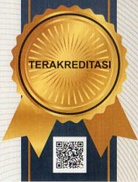Mind Mapping and Positive Mental Attitude to Enhance Secretarial Duties
Abstract
Keywords
Full Text:
PDFReferences
Adam, A.-K. (2015). The Efficacies of Secretarial Profession by Ghana Education Service and Higher Education Institutions. Journal of Education and Practice, 6(18), 81–113. http://search.ebscohost.com.proxy-ub.rug.nl/login.aspx?direct=true&db=eric&AN=EJ1079710&site=ehost-live&scope=site
Alwasilah, A. C. (2019). Pokoknya Studi Kasus Pendekatan Kualitatif (2nd ed.). PT Kiblat Buku Utama.
Batdi, V. (2015). A meta-analysis study of mind mapping techniques and traditional learning methods. Anthropologist, 20(1–2), 62–68. https://doi.org/10.1080/09720073.2015.11891724
Budd, J. (2004). Mind Maps As Classroom Exercises Metello Mugnai Teaching labor relations: Opportunities and challenges of using technology. The Journal of Economic Education, 35(1), 35–46.
Buzan, T. (2006). The Ultimate Book of Mind Maps. HarperCollins Publishers. http://books.google.com/books?id=v4-D6Pu_9bAC&pgis=1
Cismaru, D., & Novac, C. (2015). APPLICATIONS OF MIND MAPPING AND CONCEPT MAPPING IN TEACHING, RESEARCH, HUMAN RESOURCES AND PUBLIC RELATIONS. INTED2015 Proceedings, 6707–6717.
Farrand, P., Hussain, F., & Hennessy, E. (2002). The efficacy of the “mind map” study technique. Medical Education, 36(5), 426–431. https://doi.org/10.1046/j.1365-2923.2002.01205.x
Gaiseanu, F. (2021). Evaluating Attitude and Behavior: An Info-Operational Procedure Related/Supported by the Cognitive Centers of Mind. International Journal on Neuropsychology and Behavioural Sciences (IJNBS), 2(1). https://doi.org/10.51626/ijnbs.2021.02.00004
Goodnough, K., & Woods, R. (2002). Student and Teacher Perceptions of Mind Mapping: A Middle School Case Study.
Hector, C. S. (2011). Visual Mapping to Enhance Learning and Critical Thinking Skills. Optometric Education, 36(3), 125–139. http://search.ebscohost.com/login.aspx?direct=true&db=ehh&AN=78201005&site=ehost-live
Holland, B., Holland, L., & Davies, J. (2004). An investigation into the concept of mind mapping and the use of mind mapping software to support and improve student academic performance. Learning and Teaching Projects 2003/2004 University of Wolverhampton, 89–94.
Jelić, Ž. J., Demarin, V., & Šoljan, I. (2014). Mind maps in service of the mental brain activity. Periodicum Biologorum, 116(2), 213–217.
Jones, B. D. (2018). Motivating students by design: Practical strategies for professors (second). Music(R). http://hdl.handle.net/10919/102728
Jones, B. D., Ruff, C., Snyder, J., Petrich, B., & Koonce, C. (2012). The Effects of Mind Mapping Activities on Students’ Motivation. International Journal for the Scholarship of Teaching and Learning, 6(1). https://doi.org/10.20429/ijsotl.2012.060105
Kakabadse, A., Khan, N., & Kakabadse, N. K. (2016). Company secretary: a role of breadth and majesty. Society and Business Review, 11(3), 333–349. https://doi.org/10.1108/sbr-04-2016-0023
Llewellyn, D. G. (2007). THE ROLE AND INFLUENCE OF THE SECRETARY IN RELATION TO GOVERNING BODIES IN HIGHER EDUCATION. In School of Management, University of Bath. University of Bath.
Malycha, C. P., & Maier, G. W. (2017). The Random-Map Technique: Enhancing Mind-Mapping with a Conceptual Combination Technique to Foster Creative Potential. Creativity Research Journal, 29(2), 114–124. https://doi.org/10.1080/10400419.2017.1302763
Mento, A. J., Martinelli, P., & Jones, R. M. (1999). Mind mapping in executive education: Applications and outcomes. Journal of Management Development, 18(4), 390–416. https://doi.org/10.1108/02621719910265577
Motha, L. C. S., Amudha, R., Surulivel, S. T., Selvabaskar, S., & Alamelu, R. (2016). Mind Maps and Employee Motivation- An Urban Perspective. Indian Journal of Science and Technology, 9(July). https://doi.org/10.17485/ijst/2016/v9i27/97637
Nesbit, J. C., & Adesope, O. O. (2006). Learning with concept and knowledge maps: A meta-analysis. Review of Educational Research, 76(3), 413–448. https://doi.org/10.3102/00346543076003413
Onifade, A. (2010). The Indispensable Secretary. Journal of Social Sciences, 22(1), 47–51. https://doi.org/10.1080/09718923.2010.11892783
Onifade, A. (2011). The Third Millennium Secretary And Information & Communication Technology: Nigerian Experience. International Journal of Management & Information Systems (IJMIS), 13(2), 39. https://doi.org/10.19030/ijmis.v13i2.4945
Palinkas, L. A., Horwitz, S. M., Green, C. A., Wisdom, J. P., Duan, N., & Hoagwood, K. (2015). Purposeful Sampling for Qualitative Data Collection and Analysis in Mixed Method Implementation Research. Administration and Policy in Mental Health and Mental Health Services Research, 42(5), 533–544. https://doi.org/10.1007/s10488-013-0528-y
Rezapour-Nasrabad, R. (2019). Mind map learning technique: An educational interactive approach. International Journal of Pharmaceutical Research, 11(1), 1593–1597.
Rhomanel Bette, T., Carneiro Zuin, D., Vieira Baêta, O., & Carvalho Moreira, N. (2021). Secretarial work in pandemic times: new skills or old tasks? Management and Adninistrative Professional Review, 111–135. http://dx.doi.org/10.7769/gesec.v12i2.1241
Shao, H. (2020). Exploration of the Application of Mind Mapping Combined with Computer Technology in Computer Teaching. Journal of Physics: Conference Series, 1578(1), 2–6. https://doi.org/10.1088/1742-6596/1578/1/012047
Stulz, K. M., Shumack, K. A., & Calkins, P. F. (2013). Procedures and Theory for Administrative Professionals (2nd ed.). South Western, Cengage Learning.
Takahashi, K. (2014). How to Use Mind Mapping for Better Thinking. Proceedings of International Academic Conferences, 702315.
https://www.designorate.com/how-to-use-mind-mapping/
Tuladhar, S. M. (2010). Secretarial Skill Development and Institutional Arrangement for Assistant Staff Training in Nepal. Administration and Management Review, 22(1), 103–115.
Z. Sh. Abdunazarova, A. G. G. (2021). Biophysics Of Brain Activity. Brain Activity In The Development Of “Creative Thinking” “Mind Map.” Turkish Journal of Computer and Mathematics Education (TURCOMAT), 12(4), 1–6. https://doi.org/10.17762/turcomat.v12i4.452
Zampetakis, L. A., Tsironis, L., & Moustakis, V. (2007). Creativity development in engineering education: The case of mind mapping. Journal of Management Development, 26(4), 370–380. https://doi.org/10.1108/02621710710740110
DOI: https://doi.org/10.32487/jshp.v7i1.1503
Refbacks
- There are currently no refbacks.
JSHP: Jurnal Sosial Humaniora dan Pendidikan
is licensed under a Creative Commons Attribution-ShareAlike 4.0 International License (CC BY-SA 4.0)




